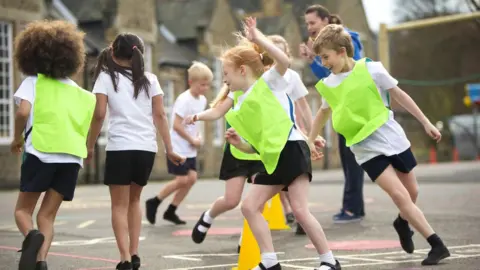NI children's lack of physical activity 'a major health concern'
 Getty Images
Getty ImagesThe low level of physical activity among children and young people in Northern Ireland has been described as a "major health concern".
The warning is contained in a research paper on their physical activity and wellbeing just published by the Northern Ireland Assembly.
It said that more than a quarter of children in Northern Ireland were classed as overweight or obese.
The research paper was written for Stormont's Education Committee.
It said several studies suggested that physical activity, particularly at school, could improve children's mental as well as physical health.
It could improve children's resilience, wellbeing and self-esteem, as well as reducing anxiety and depression, for instance.
The World Health Organisation (WHO) recommends 60 minutes of physical activity a day for children.
But the assembly paper said that children in Northern Ireland were less likely to meet that recommendation than any other country in Europe.
A separate study carried out in 2018 suggested that only 13% of school children in Northern Ireland had an hour of physical activity a day.
 Getty Images
Getty ImagesGirls are less likely to meet that target than boys, especially as they get older.
The paper said that was partly down to a lack of "balance" in what schools offered.
"While there is some breadth in the range of PE activities on offer in primary schools, the post-primary PE curriculum remains games dominated, particularly for males," it said.
"As a result, children whose interests are in non-traditional sports and physical activities are less likely to feel engaged with PE lessons and are less likely to develop an interest that they can carry into the community setting or adulthood.
"Children's emotional health, physical fitness and obesity levels are resultant of a complex range of individual, family and community level factors which schools alone cannot solve.
"However, schools can have a direct and measurable impact on children's weight and physical wellbeing.
"For many children, school is the main opportunity they have for being physically active, either through PE or after-school activities."
 Getty Images
Getty ImagesBut the paper said that many primary school teachers did not get adequate training to deliver effective PE lessons.
Guidance from the Department of Education recommends that schools provide pupils with a minimum of two hours of PE each week.
"However, it is up to individual schools to decide how much time is allocated to PE and research suggests schools are falling short on achieving this, particularly in the primary years," the research paper said.
Previous studies suggest that around one in five primary pupils get less than half an hour of PE a week, while only four in 10 post-primary pupils get the recommended two hours.
"Commentators have argued that the absence of a 'requirement' to meet this two hour per week guideline, means that progress and change is difficult to achieve in terms of time allocation in the face of 'curriculum squeeze' where increasing focus is placed on exam outcomes," the assembly paper said.
A number of programmes have been set up in schools in Northern Ireland to try to increase pupils' physical activity, including the daily mile.
The Curriculum Sports Programme, which is run by Gaelic Athletic Association (GAA) and Irish Football Association (IFA), also runs in some primary schools.
While most of the previous research the assembly report cites was carried out prior to the coronavirus pandemic, children were prohibited from playing outdoor sport for a number of months in early 2021.
As children were being taught remotely from December until March, PE in schools was also affected by lockdowns.
